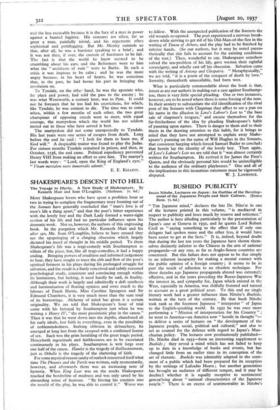SHAKESPEARE'S DESCENT INTO HELL
The Voyage to Illyria. A New Study of Shakespeare. By Kenneth Muir and Sean O'Loughlin. (Methuen. 7s. 6d.) MOST Shakespeare lovers who have spent a profitless hour or two in trying to complete the fragmentary story looming out of the Sonnets have generally concluded that " man's love is of man's life a thing apart," and that the poet's bitter experience with the lovely boy and the Dark Lady formed a water-tight section of his life and had no particular influence upon his dramatic work. Not so, however, the authors of this engrossing book. In the purgation which Mr. Kenneth Muir and his alter ego, Mr. Sean O'Loughlin, believe to have ensued they see the upspringing of a clinging obsession which largely dictated his trend of thought in his middle period. To them Shakespeare's life was a tragi-comedy with Southampton as villain of the piece, but, like all tragi-comedies, it had a happy ending. Bringing powers of erudition and informed judgement to bear, they have sought to trace the ebb and flow of the poet's spiritual ferment in his plays during his prolonged struggle for salvation, and the result is a finely conceived and subtly reasoned psychological study, consistent and convincing enough within its limitations, but lacking, it need hardly be said, in finality. Although their work is largely and admittedly a deft synthesis and harmonisation of floating opinion and owes much to the labours of Frank Harris, Miss Caroline Spurgeon and Sir Edmund Chambers, it is very much more than the sum total of its borrowings. Alchemy of mind has given it a certain originality. We are told that Shakespeare's hour of trial came with his betrayal by Southampton just when he was writing 2 Henry IV," the most pessimistic play in the canon." Then it was that he went down into the depths, abandoned all his early ideals, lost faith in everything, even in the possibility of noblemindedness. Seeking oblivion in debauchery, he emerged at long last from the cesspool with a confirmed horror of sex. Such was the grim heralding of the great tragic period. Henceforth ingratitude and faithlessness. are to be excoriated continuously in his plays. Southampton is writ large over one half of the canon. Hamlet is the tragedy of disillusionment, just as Othello is the tragedy of the shattering of faith.
For some mystical reason sanity of outlook reasserted itself what time The Phoenix and the Turtle was written, only momentarily, however, and afterwards there was an increasing note of hysteria. When King Lear was on the stocks Shakespeare reached the borderline of madness and was only saved by his abounding sense of humour. " By forcing his emotion into the mould of the play, he was able to control it." Worse was to follow. With the unexpected publication of the Sonnets the old wounds re-opened. The poet experienced a nervous break- down while striving to get rid of his Old-Man-of-the-Sea in the writing of Timon of Athens, and the play had to be finished by inferior hands. (So our authors, but it may be noted parer. thetically that this fails to account for the existing conditions of the text.) Then, wonderful to say, Shakespeare somehow solved the sex-problem of his life, gave women their rightful sovereignty, and wholly cast off his obsession. Salvation came with the writing of Antony and Cleopatra. " Metaphysically," we are told, "it is a poem of the conquest of death by love." Serenity, thenceforth unassailable, had been won.
What is particularly commendable about the book is that, intent as are our authors in making out a case against Southamp- ton, there is very little special pleading. One or two instances, however, are to be noted where there is some forcing of the note. In their anxiety to substantiate the old identification of the rival poet of the Sonnets with Chapman they affect to see a pun on his name in the allusion in Love's Labour's Lost to "the base sale of chapmen's tongues," and excuse themselves for the far-fetchedness of the idea by pleading Shakespeare's habit of punning upon names. There is danger to them and to their thesis in the drawing attention to this habit, for it brings to mind that they have not attempted to explain away Shake- speare's punning on the name of Will Hughes in the Sonnets, that consistent harping which forced Samuel Butler to conclude. that herein lay the identity of the lovely boy. Then again, of Love's Labour's Lost we are told that it "was almost certainly written for Southampton. He revived it for James the First's Queen, and the obviously personal hits would be unintelligible to the audience of the ordinary playhouses." One and all of the implications in this incautious statement must be vigorously






































 Previous page
Previous page